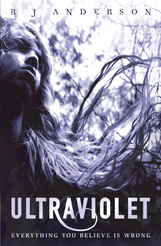 Ultraviolet was a book I was granted access to just before the fire, and so this review has been about a month in coming. Since I just finished managing to get internet installed and set up last night, I figured I'd start work on this as soon as possible. So here I am.
Ultraviolet was a book I was granted access to just before the fire, and so this review has been about a month in coming. Since I just finished managing to get internet installed and set up last night, I figured I'd start work on this as soon as possible. So here I am.Ultraviolet is about Alison, a girl whose special talents include seeing sounds and hearing colors. Oh, and apparently managing to make girls shatter into a million pieces and vanish, making everyone think she was murdered, but that's only happened once. After that, however, Alison's mind simply shatters, and her mother has her put into a mental home, where Alison finds a researcher who diagnoses her strange talents as synesthesia. Soon Alison and the researcher begin to bond as he teaches her about her unique views on the world. But Alison's new friend has a lot of secrets, including knowledge about what, exactly, happened to the missing girl that Alison destroyed.
I'm not going to lie, pretty much the entire draw of this book for me was the main character's synesthesia. The actual plot didn't really interest me all that much, besides the usual 'oh, she has powers! let's read!' draw that I usually get. I wasn't really expecting much from this book, which might be why I actually liked it.
I was looking to read about her synesthesia, which should tell you right away that it's one of my favorite things about the book. This book kind of reminds me of The Chosen One, because the sole reason I read it was because of a specific aspect of the setting/character, rather than the plot. It was an interesting look through the eyes of something that isn't usually written about, and I probably would have marked this as an okay book just because of that aspect of Alison's character.
As far as the plot goes, I'd say it was decent. This book certainly isn't going to be my next favorite, nor will I be going to get a paper copy just to put on my book shelf of 'the best', but it wasn't bad. The plot twists are just twisty enough without being M. Night level freakishness, with a good amount of foreshadowing that, while tying everything together, doesn't completely spell out the entire ending like so many others.
I enjoyed Alison's characterization, although I wasn't particularly interested in any of the other characters. None of them really stuck out besides Alison and her mother, and her mother only interested me in a 'god, she's a bitch' sort of way that doesn't really say very good things.
All in all, I'd say Ultraviolet was a pretty good book for what it was, and it's a nice addition to the YA bookshelves. It's not spectacular, but let's be honest: not everything can be the next Harry Potter. As far as recommending Ultraviolet, however, I am honestly not sure what it appeals to. Fans of typical YA asylum books such as Suicide Notes by Michael Thomas Ford or It's Kind of a Funny Story by Ned Vizzini may find Ultraviolet interesting, but because the book seems to be more mystery and sci-fi, I'm not sure if Ultraviolet can just be chalked up to 'another crazy teenager book'. At the same time, Ultraviolet may appeal to fans of powered up teenagers, like Shatter Me by Tahereh Mafi or Hero by Perry Moore, but since Alison has synethesia more than actual powers, I'm not sure if Ultraviolet fits this niche either.
So for once, I'm at a loss for who to recommend a book for specifically. If you're interested in a light, YA read about mental homes and synethesia, Ultraviolet might be for you. If you're just looking for a YA mystery with some sci fi and romance mixed in, pick up Ultraviolet. And if you want to try a book that's a little hard to classify, then I'd say you should find a copy of Ultraviolet when it comes out on September 1st.